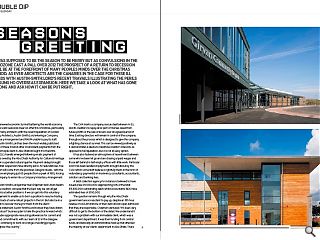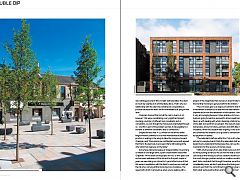Seasons Greetings
13 Jan 2012
It was supposed to be the season to be merry but as convulsions in the Eurozone cast a pall over 2012 the prospect of a return to recession will be at the forefront of many peoples minds over the Christmas period. As ever architects are the canaries in the cage for these ill winds with Austin-Smith:Lord's recent travails illustrating the perils of hung ho overseas expansion. Here we take a look at what has gone wrong and ask how it can be put right.
With renewed economic turmoil battering the world economy there is scant seasonal cheer on offer this Christmas, particularly so for many architects with the recent liquidation of Gordon Murray Architects, Austin-Smith:Lord entering a Company Voluntary Arrangement and RMJM unable to pay its staff.Austin-Smith:Lord has been the most widely publicised victim of these ill winds after inconsistent payments from the firms principle client in Abu Dhabi brought it to the brink.
A-S:L’s travails emerged following erratic payment of monies owed by the Abu Dhabi Authority for Culture & Heritage for their suspended cultural quarter. Payment delays brought on by that suspension have directly led to 70 redundancies, five of which will come from the practices Glasgow studio, with the firm now employing just 65 people (from a peak of 180), forcing the company to enter into a Company Voluntary Arrangement (CVA).
Austin-Smith:Lord partner Neil Chapman told Urban Realm: “All the creditors concede that the best way we can all get back into a better position is if we can get into this voluntary arrangement to enable us to be in a position to resume trading on the back of some robust projects in the UK. But also be in a position to recover money for them from the client.”
In a statement Austin-Smith:Lord insisted they have drawn up a “robust” business plan to take the practice forward which: “…includes appropriate resourcing allowances for current and planned commitments with our team of 22 in the Glasgow studio continuing to work on a range of exciting projects throughout the country.”
The CVA marks a company rescue deal between A-S:L and its creditors to repay all or part of monies owed from future profits or the sale of assets over an agreed period of time. Existing directors will remain in control of the company throughout the process which is designed to give the company a fighting chance at survival. This can be viewed positively as it demonstrates a desire to maximise creditor’s interests, as opposed to full liquidation, but it is not an easy option.
It has also fostered an atmosphere of resentment between some who’ve been let go and are chasing unpaid wages and those left behind in half empty offices with little work. Particular scorn has been levelled at payments brought about by the CVA (which some staff believe is rightfully theirs in the form of redundancy payments) on insolvency consultants, accountants, solicitors and banking fees.
A debt collection agency for instance is believed to have issued a fee of £1,133,000 (approaching 10% of the total £11,300,000 outstanding debt) whilst accountants BDO have estimated fees of £100,000.
The question remains though why the Abu Dhabi government are so reluctant to pay up, despite an 11th hour release of a £2.4m tranche of their debt and an open admission that they are responsible. Chapman ventured: “It’s been very difficult to get to the bottom of the detail. We understand it was not a problem with our immediate client, which was a government department, it was their funding from central funds, and basically an administrative hold up that affected the majority of our clients department in Abu Dhabi. There was nothing personal in this; it might well have taken the client as much by surprise as it unfortunately did us. That’s why our relationship with the client has remained as cooperative as possible because we didn’t see the immediate fault lying at their door.”
Chapman stressed that not all this cash is due to A-S:L however. “We were coordinating a very significant project, involving a number of different sub consultants and co consultants, so even though the money was channelled through us – and this is part of the problem we had, it was payable to a number of different consultants and co contractors.”
Despite the fact that A-S:L remain on the brink a white knight investor, believed to be a rival international architecture practice, is waiting in the wings to take the company forward. Chapman said: “Discussions are confidential; we’ve both agreed that that is the best way to proceed. We’re still looking at the offer which has been put on the table.”
Some have claimed a degree of irresponsibility in becoming so reliant on one large client, a point Urban Realm raised with Chapman: “We’ve been on the project for four or five years now and we were well aware of the risk and for the past couple of years we were doing our utmost to try and offset some of that. We were in negotiation with the client to see how we could get the risk of us carrying all that invoicing more in balance. The speed with which it can build up when you’re dealing with a project of the magnitude that we were, it doesn’t take long for the monthly invoicing to get yourself into the millions.”
“The CVA does give us a degree of comfort in that it is a mechanism to enable us to deal with the debt almost as a separate issue from the remainder of the business. I think that is very encouraging because it does enable us to focus on the business going forward as opposed to all our sweat being taken up with dealing with what is basically a historic legacy of the debt accrued from one project. We were all under a tremendous amount of stress, partners and staff alike in terms of salaries, whilst this situation was ongoing. As far as the staff are concerned this enables us to go back to sensible and regular full payment of salaries.
“The redundant staff are within the CVA so it’s a healthier picture for everybody and I think the redundant staff are beginning to understand that because they can see the clear mechanism for the recovery of monies owed.
“With a full recovery from Abu Dhabi we’re out of the CVA so we’re pushing as hard as we can now for that as soon as we can because that would put all our creditors and the business in a much stronger position and all our creditors would be paid. We’re confident that through December we will receive considerably more, we don’t quite know the timing and the amounts yet, that’s the commitment we’ve been given and that’s what we’re pushing them and holding them too.”
Read next: Carbuncles 2012: Linwood
Read previous: Fort William
Back to January 2012
Browse Features Archive
Search
News
For more news from the industry visit our News section.
Features & Reports
For more information from the industry visit our Features & Reports section.




